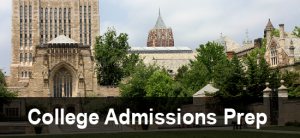College admissions officers and scholarship committees care about your leadership experience.
A quick look at the “Admissions” page of almost any college will reveal this fact, but let’s check out a few examples:
Princeton emphasizes that they’re looking “for students who make a difference in their schools and communities” and encourages you to tell them “about your leadership activities, interests, special skills and other extracurricular involvements.”
Duke provides a list of “Key Characteristics We Seek” to let you know they’re interested in students who have a strong “sense of engagement—with ideas, with other people, with a community” and have “the ability and desire to make a difference.”
Six of my students were accepted to Princeton and Duke during the 2014-2015 admissions cycle. They all had strong, exciting track records in these categories as well as excellent grades and standardized test scores.
Scholarship committees are also quite explicit about the role that leadership plays in the selection process.
The University of Southern California points out that the selection criteria for their full-tuition Trustee Scholarships “include academic excellence, leadership, and community service.”
Likewise, the Egleston Scholars Program at Columbia’s Fu Foundation School of Engineering and Applied Science is looking “to educate socially responsible engineering and applied science leaders whose work results in the betterment of the human condition, locally, nationally, and globally.” The students accepted into this program “comprise the top one percent of Columbia Engineering applicants” and receive significant support from the school (including a stipend).
Two of my students who earned these scholarships had truly meaningful leadership experience in these fields.
I just picked a few colleges to illuminate my point, but I encourage you to see what your reach, match, and safety schools have to say about the role that leadership plays in their admission and scholarship processes.
Now let’s consider what constitutes true leadership, how you can develop leadership experience in high school, and where you should talk about leadership in your college applications.
WHAT IS LEADERSHIP?
Let’s get back to basics by considering the traditional definition of leadership.
The dictionary tells us that leading involves directing “the operations, activity, or performance” of something. It’s about being in charge.
But just being in charge of other people—just being president of your class or vice president of a club—isn’t what matters.
We need to expand our sense of what constitutes leadership.
In College Admissions for the 21st Century, Robert J. Sternberg (former Dean of Arts and Sciences at Tufts) defines leadership “not in the sense of achieving a level of authority, but rather as making a positive, meaningful, and hopefully enduring difference to the world at some level.”
So there’s a close connection between leading and serving.
The reality is that lots of students have leadership titles but aren’t true leaders. They haven’t made a real difference in the lives of students at their schools or in their clubs. They haven’t helped solve a pressing problem in their school, community, region, or country.
HOW CAN YOU DEVELOP YOUR LEADERSHIP EXPERIENCE?
1. Get my free presentation on leadership and initiative, which provides you with step-by-step guidance on what you can be doing in 9th, 10th, 11th, and 12th grade and grants you access to a case study of a student leader. I share with you so much more than I can here in a blog post.
2. Think outside the box. You don’t always need to have a leadership title to be a leader.
Let’s say that you’re interested in biomedical engineering and came across Limbitless Solutions, a “non-profit organization devoted to building a generation of innovators who use their skills and passion to improve the world around them,” mainly by “using additive manufacturing to advance personalized bionics and solutions for disabilities.” This group believes that “no family should have to pay for their child to receive an arm.”
Some of my students have started their own non-profit organizations, which is great. But you can also contribute to existing projects. You might want to lead a fundraising campaign at your school or in your community to help raise funds for Limbitless.
3. Learn about some of the problems facing students at your school or people in your community.
Choose a problem that you really care about solving, come up with a few specific and realistic things you can do to help solve the problem, and form a team of people who will help you reach your goal. Some of my students—like the one who was accepted into the Egleston Scholars Program at Columbia—connect their leadership and service projects to their specific academic interests.
Here’s a great example of a leadership and community service project that was started by one of the students in my daughter’s school district. Operation Soap Dish, which “provides toiletry and household cleaning supplies to people in need,” has “collected/distributed over 30,000 items valued at $75,000,” and their “campaign to increase awareness for the need for toiletry and household cleaning items has reached over 200,000 people within the United States, Canada, and Israel.” On their website, they have tips on how you can start your own collection drive.
4. Read about the inspiring projects of teen leaders to get your creative juices pumping. Click here to read about Sanah Jivani who launched the Natural Day movement.
5. Learn about leadership skills and characteristics. Check out Simon Sinek’s “How Great Leaders Inspire Action.” Read articles about leadership in Fast Company and the Harvard Business Review.
WHERE SHOULD YOU TALK ABOUT
LEADERSHIP IN YOUR COLLEGE APPLICATION?
It’s not enough to just have the kinds of leadership experiences that I’ve been addressing here in this post. It’s not enough to just list your experiences in the “Activities” section of the Common App.
Admissions officers want you to give them behind-the-scenes access to specific experiences and your perspectives on them.
The main Common Application essay is one great place to address how. . .
- You helped solve (or want to help solve) a particular problem
- Your leadership experience caused you to question or challenge a belief or idea
- You “faced a challenge, setback, or failure” in your process of leading
- One of your leadership projects is connected to “an accomplishment, event, or realization that sparked a period of personal growth and a new understanding of yourself or others”
Remember, you don’t want to just describe the external experience. You want to strike just the right balance between external and internal details.
You might also want to consider adding details about your leadership in the Additional Information section of the Common Application.
NEED HELP?
Schedule a consultation with me if you want help coming up with leadership projects that are directly related to your interests, developing action plans, or writing about your leadership experience in your college application essays.
Blog post image used: ©dolgachov/bigstock.com



